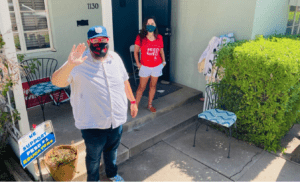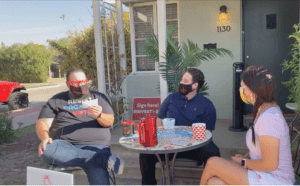By Scottsdale Pinetop
The future of school funding and education reform has been a point of concern among voters and state leaders. And with the Invest in Education proposal certified to be on the upcoming ballot, conversations surrounding the public-school system are more important now than ever.
Helping to expand the dialogue is Café con Chico, a weekly virtual podcast inviting a variety of guests from all walks of life to discuss public education and topics that directly impact students, educators and parents in Arizona.

Photos provided by Chico Robinson
Chico Robinson, founder and creator of Café con Chico, comes from a family of educators. Both of his parents were educators at North High School and was always exposed to kids in education. After graduating from college, he started teaching at a high school in Portland Oregon. He now teaches at Kenilworth Elementary and has come an activist for the Red for Ed movement.
He is joined by Representative Isela Blanc, who has been a strong advocate for educators and education reform. Representative Blanc was elected in 2016 to represent District 26. As a mom in the public education system, she became increasingly aware of disappearing programs and increasing classroom sizes and decided to take action. She served as a school liaison of years and worked on early-childhood programs.
Guests on Café con Chico have included 2019 Arizona Teacher of the Year Kareem Neal, Executive Director at the Arizona Educators Association (AEA) Luis Heredia, Arizona Senator Lela Alston, political consultant Antonio Valdovinos, Political Director for AEA Ellie Perez, and numerous others.
We had a chance to talk with host Chico Robinson and Representative Isela Blanc to share their thoughts on Invest in Ed and connecting with Arizona educators.
How did Café con Chico come to be?
In early July, I was partnering with Adrian Fontes and small-business activist Tim Castro to help gather signatures for the Invest In Ed ballot measure. To help explain Invest In Ed, we decided to create a short video explaining the initiative to voters. We received so much support from the video and numerous requests for us to continue creating them. And it just grew from there.
Shortly after that, I had Representative Isela Blanc as one of my special guests. She’s always been one of my favorite representatives and have admired her commitment to education. We just hit it off and decided to co-host the show together.
The Arizona Supreme Court ruled that the Invest In Ed ballot measure, now known as Proposition 208, will be included on the November ballot. What was your involvement in making that happen?
Chico: In early July, AEA members were tasked to collect 200,000 signatures while in the middle of a pandemic. While this seemed like a daunting task, many of my friends, colleagues and fellow teachers were up to the challenge. As educators, we decided to get creative. We created socially distance outdoor events, found safe public places, designed drive-thru signature locations and many other unique tactics. Not only did we gather the requested 200,000 signatures, but we doubled it – finishing with well over 400,000 signatures! To me, that says the general public wants education to be funded and education is a priority for Arizona voters.
Isela: Teachers really didn’t give up, even with all of the challenges and obstacles they had to face. Various organizations and group came together during this time to support the initiative and do their part to safely gather signatures. That speaks volumes about the commitment of educators and the dedication of Arizona voters to see it on the ballot. It’s time to let democracy work and let voters decide.

Photo provided by Chico Robinson
You’ve had a wide range of guests on the show from across the education spectrum, from teachers to activists to legislatures. How have these different perspectives influenced or changed your views on education?
Chico: Public education does not just include elements from a classroom and lessons from a textbook, but also the surrounding community. This includes local activists fighting for change, social justice, business leaders, legislatures, parents. All of these people impact education in different ways. Our vision for Café con Chico is to incorporate every element of public education and explore the various aspects within it. And sharing these perspectives to the broader audience. The most rewarding thing I’ve received from these conversations is to continue learning something new every day, both the good and the bad. It’s been an incredible process to learn what’s going on in our state in terms of education. Question everything!
Isela: Through these conversations, and the circumstances surrounding the pandemic, the weaknesses of the public education systems are being exposed due to a lack of funding for education. So often the voices of teachers and educators are missing from the conversation when it comes to education reform. How do we have constructive conversations without neglecting other viewpoints? It’s been an incredible opportunity to be able to be behind the scenes and being a part of these dialogues.
Is there anything else you would like people to know about Café con Chico?
Chico: Café con Chico has become a tribute to educators. We want to acknowledge the hard work they are doing to make this state batter. We are listening. And it just shows that anybody can make a difference. Whether it’s collecting signatures, making phone calls or asking questions. I was an educator who marched at the Capitol. It was empowering to see people fighting for change. I’m happy to help do my part to make change happen.
Isela: I challenge everyone to take moments and start listening to the conversation. And remind everyone to have empathy. These quick 10 minute interviews at Café con Chico have created some great dialogues and these are important conversations to have if we want to move forward. These are just simple neighborhood conversations anyone can have. We can all learn from others to think outside of the box.
To learn more about Café con Chico, please visit their website at cafeconchico.com. Interviews can be viewed on their YouTube channel.

